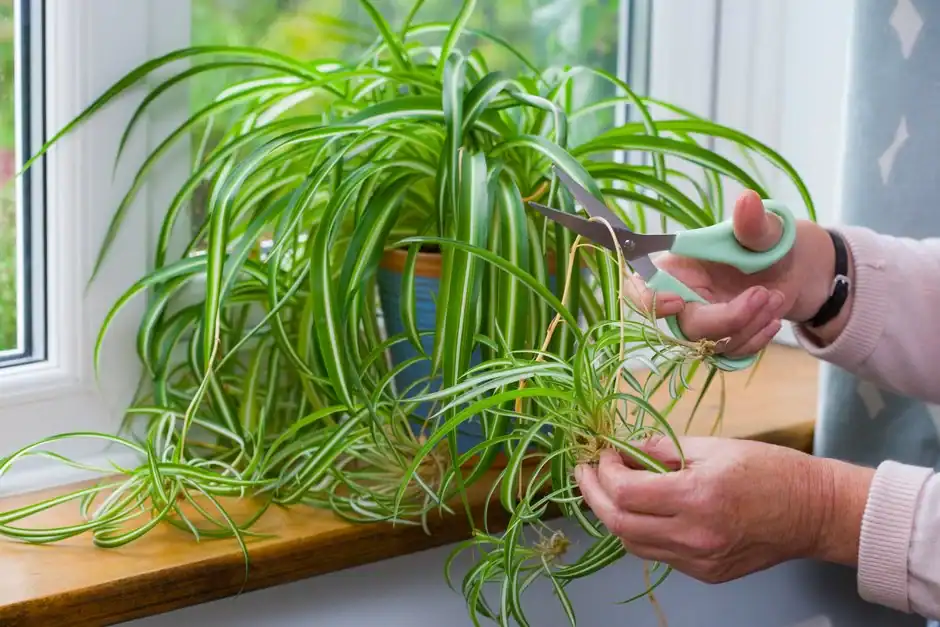Creating a warm and inviting space for your tortoise is all about choosing the right plants. Aside from adding a splash of color to your home, these plants can also contribute positively to your pet’s diet.
For example, pothos are a fantastic option since they’re safe and super easy to care for.
They thrive indoors and bring a range of nutrients to your scaly companion.
Having the right greenery can make your tortoise’s environment lively, keeping them healthy and content.
Some popular options include snake plants and peace lilies. Both are robust and can adapt beautifully to indoor life. You might also consider adding some succulent varieties, spider plant, pothos, snake plant, and peace lily to enhance your indoor garden.
Here are some suggestions from Top Tortoise:
| Plant | Type | Benefits for Tortoise | Care Notes Indoors | Cautions |
|---|---|---|---|---|
| Spider Plant (Chlorophytum comosum) | Leafy ornamental | Safe if nibbled, mild fiber source | Thrives in indirect light, easy care | May get overgrazed → keep backup pots |
| Pothos / Devil’s Ivy (Epipremnum aureum) | Vine | Provides cover, climbing enrichment | Grows well in low light, trailing plant | Edible in very small amounts, but limit (oxalates) |
| Wandering Jew (Tradescantia zebrina) | Trailing plant | Safe, adds humidity and ground cover | Likes bright, indirect light, moist soil | Can cause mild skin irritation → monitor |
| Hibiscus (Hibiscus rosa-sinensis) | Flowering shrub | Leaves & flowers edible, tortoises love them | Needs bright light / sun indoors | Provide occasional pruning for growth |
| Christmas Cactus (Schlumbergera spp.) | Succulent | Non-toxic, safe if chewed | Low maintenance, blooms in winter | Avoid overwatering |
| Areca Palm (Dypsis lutescens) | Palm / foliage | Provides shade, hiding cover | Thrives in bright, indirect light | Safe but not very nutritious |
| Bamboo Palm (Chamaedorea seifrizii) | Palm | Adds humidity & shelter | Great for shaded corners indoors | Non-toxic, safe for décor |
| Orchid (Phalaenopsis spp.) | Flowering | Non-toxic if nibbled, decorative | Needs filtered light & humidity | Not a food source, mainly enrichment |
| Herbs (Basil, Parsley, Mint, Thyme) | Culinary herbs | Edible & aromatic enrichment | Small pots indoors, bright light | Use as snacks, not staple diet |
| African Violet (Saintpaulia) | Flowering plant | Safe, decorative | Likes indirect light, consistent watering | Flowers edible in moderation |
Choosing Safe Houseplants For Tortoises
Creating a cozy and safe space for your beloved tortoise can really elevate their well-being and happiness. Choosing nontoxic greenery is a big part of that.
For instance, ferns and bamboo palms make fantastic additions to their environment.

Not only do these plants enhance the aesthetic appeal of your space, but they also offer a safe haven for your tortoise to explore.
It’s important to remember, though, that not all tropical plants are suitable companions. Some can lead to irritation or illness, so doing a bit of research before introducing new items is a smart move.
Incorporating a variety of safe houseplants can truly liven things up, helping your tortoise feel secure and entertained
Best Succulent Varieties For Tortoise Enrichment
If you’re looking to create a lively atmosphere for your tortoise, incorporating some vibrant plants can work wonders. Succulents, with their unique textures and shapes, offer not just nourishment but also a delightful space for exploration.
Many of these drought-resistant species are low-maintenance and thrive beautifully in varied indoor conditions.
For instance, Aloe Vera is a standout—its gel is beneficial for your tortoise’s skin and overall health.
Hens and Chicks are another great option; they flourish indoors and are completely safe for your pet to munch on. With these plants, you’ll cultivate an engaging environment that encourages your shelled buddy to wander and bask comfortably.
These plants, including drought-resistant species, low-light plants, humidity-loving flora, air-purifying plants, and flowering indoor plants, can transform any space into a vibrant and sustainable environment.
How To Care For Spider Plants?
Bringing a little greenery into your home can be both rewarding and fun, especially with some vibrant indoor gardening options. One such choice is the charming spider plant, known for its striking ornamental foliage.
These beauties thrive best in bright, indirect sunlight, so think about positioning them near a sunny window.
Keeping the temperature within the cozy range of 65-75°F will help them flourish.
Plus, they enjoy a touch of moisture in the air, so don’t forget to monitor humidity levels.
When it comes to watering your spider plants, it’s simple: just check the soil. If it’s dry about an inch down, it’s time for a drink. But be careful not to overwater, as this can lead to root rot, a common issue for terrarium plants, ornamental foliage, and pet-safe botanicals in indoor gardening.
Understanding Pothos And Its Benefits
If you’re on the hunt for some easycare greenery to spruce up your home, look no further. This plant showcases vibrant foliage that can truly light up any room, all while adapting effortlessly to various indoor conditions.
It’s an incredibly versatile choice, making it a superb addition to a tortoise habitat.
Thriving in moisture-retentive soil, this plant stays healthy and stress-free, adding a breath of fresh air to your space.
Besides enhancing the aesthetic of your tortoise’s environment, this greenery brings along air-purifying benefits, contributing to a healthier living space for your pet.
Its leafy branches also create natural hiding spots, which can significantly boost your tortoise’s comfort and overall well-being. So, if you’re considering incorporating easycare greenery like the rubber plant into your home, you’ll enjoy vibrant foliage and the added bonus of edible houseplants, all thriving in moisture-retentive soil.
Easycare Greenery
- Vibrant foliage enhances the aesthetic appeal of any room.
- Adapts well to various indoor conditions, making it a versatile choice.
- Provides air-purifying benefits, contributing to a healthier living space.
- Creates natural hiding spots, improving comfort and well-being for pets like tortoises.
Selecting Humidity-loving Flora For Reptiles
Crafting an inviting space for your reptiles is all about the right plants. By incorporating humidity-loving varieties, you’re not just sprucing up the scenery; you’re also boosting the overall health of your pet’s environment.
Nonirritant foliage, such as ferns and bromeliads, thrive beautifully in these settings and can work wonders for your scaly friends.

They offer much-needed shade while helping to keep moisture levels stable.
Be sure to keep an eye on those humidity levels to steer clear of pesky mold issues. Exploring shadetolerant plants, such as clumping bamboo, aromatic herbs, and herbal plants with nonirritant foliage, can really expand your options and contribute to a vibrant ecosystem that supports your reptiles!.
Why Peace Lilies Are Pet-safe?
If you’ve ever looked around your home and thought about how to keep it safe for your pets, you might find that houseplants can be a bit of a mystery. Peace Lilies are a great option for pet owners seeking out easy-growing houseplants.
Unlike many common indoor plants, these beauties are non-toxic to pets, allowing your curious cat or dog to explore without any worries.
Besides being pet-friendly, Peace Lilies also purify the air.
They filter out toxins, which creates a healthier environment for both you and your furry friends.
Their lush green leaves certainly add a lovely touch to your home décor, making them a stylish choice in any setting.
For tortoises, having these hardy indoor plants around promotes environmental enrichment. They help maintain a cool microclimate by filtering air and providing a touch of nature, making them ideal for easygrowing houseplants and hardy indoor plants in organic gardening and biophilic design.
| Plant Type | Benefits |
|---|---|
| Peace Lily | Non-toxic to pets |
| Peace Lily | Air purification |
| Hardy Indoor Plants | Environmental enrichment for tortoises |
| Hardy Indoor Plants | Maintain a cool microclimate |
Exploring Drought-resistant Species For Indoor Gardens
If you’ve ever felt the frustration of trying to keep indoor plants alive with minimal effort, you’re in for a treat. There’s a whole world of stunning plants out there that thrive on less water and still manage to add a splash of colorful leaves to your space.
These ecofriendly indoor plants not only beautify your home but also ease your maintenance routine and provide a vibrant atmosphere.
For tortoise enthusiasts, choosing the right plants can make a world of difference.
The right selections offer environmental enrichment without the constant worry of overwatering, making it simpler to create a healthy habitat for your shelled pals.
Plus, many of these plants shine in different light conditions, ensuring versatility across various rooms in your home.
Now let the colorful leaves of ecofriendly indoor plants create a space filled with restorative plants and environmental enrichment, enhancing the natural aesthetics of your home.
Creating A Tortoise-friendly Indoor Gardening Space
Setting up a cozy area for your tortoise inside your home can be both fun and rewarding. With a mix of lush greenery and safe plants, you can create an inviting environment that reflects their natural habitat.
Tortoises flourish in spaces filled with moisture-loving species, which mimic the damp earth they might roam in the wild.
When scouting for perfect plants, it’s a good idea to check their toxicity levels; options like dandelions and clover are not only safe but also contribute to sustainable gardening practices.
These edible additions can enhance your tortoise’s diet while creating a vibrant indoor oasis. Make sure to arrange your plants thoughtfully, allowing your shelled friend to explore freely and safely, transforming their space into a relaxing retreat. As you delve further into this journey, consider incorporating the lush greenery of sustainable gardening, the vibrant appeal of exotic houseplants, and the charm of decorative succulents and moisture-loving species to create a thriving indoor oasis.
| Plant Type | Benefits |
|---|---|
| Dandelions | Safe for tortoises and edible |
| Clover | Non-toxic and nutritious |
| Moisture-loving species | Mimics natural habitat |
| Exotic houseplants | Adds vibrancy to the indoor environment |
Conclusion
Creating a nurturing space for your tortoise contributes significantly to their well-being. Choosing beneficial houseplants not only brightens your home but also meets the dietary needs of your shelled companion.
It’s important to be aware, though, that not every plant is safe; some can pose risks.
Engaging in thorough research will help you select the right varieties for your pet.
Caring for decorative plants also requires a bit of attention to their light and moisture needs. Many people make common mistakes, like choosing toxic species or forgetting to provide proper care.
With mindful selections, you’ll craft vivarium decor that’s attractive and safe for your tortoise, ensuring they thrive in a cozy environment
Originally posted 2025-02-12 08:18:29.




